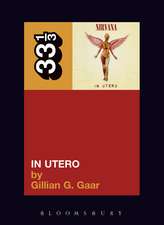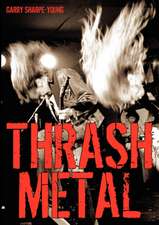Touraj Kiaras and Persian Classical Music: An Analytical Perspective: SOAS Studies in Music
Autor Owen Wrighten Limba Engleză Hardback – 26 aug 2009
Din seria SOAS Studies in Music
-
 Preț: 341.09 lei
Preț: 341.09 lei - 9%
 Preț: 867.47 lei
Preț: 867.47 lei - 9%
 Preț: 936.97 lei
Preț: 936.97 lei -
 Preț: 310.03 lei
Preț: 310.03 lei -
 Preț: 310.03 lei
Preț: 310.03 lei - 9%
 Preț: 866.80 lei
Preț: 866.80 lei -
 Preț: 310.75 lei
Preț: 310.75 lei -
 Preț: 311.41 lei
Preț: 311.41 lei -
 Preț: 341.57 lei
Preț: 341.57 lei -
 Preț: 297.50 lei
Preț: 297.50 lei -
 Preț: 377.82 lei
Preț: 377.82 lei - 30%
 Preț: 768.69 lei
Preț: 768.69 lei - 18%
 Preț: 1121.01 lei
Preț: 1121.01 lei - 18%
 Preț: 1063.31 lei
Preț: 1063.31 lei - 31%
 Preț: 766.26 lei
Preț: 766.26 lei - 31%
 Preț: 765.43 lei
Preț: 765.43 lei - 18%
 Preț: 1060.25 lei
Preț: 1060.25 lei - 18%
 Preț: 1058.19 lei
Preț: 1058.19 lei - 18%
 Preț: 1060.11 lei
Preț: 1060.11 lei - 18%
 Preț: 1063.41 lei
Preț: 1063.41 lei - 28%
 Preț: 826.84 lei
Preț: 826.84 lei - 28%
 Preț: 823.17 lei
Preț: 823.17 lei - 18%
 Preț: 1053.16 lei
Preț: 1053.16 lei - 18%
 Preț: 239.96 lei
Preț: 239.96 lei - 18%
 Preț: 1050.09 lei
Preț: 1050.09 lei -
 Preț: 375.50 lei
Preț: 375.50 lei - 31%
 Preț: 766.24 lei
Preț: 766.24 lei - 26%
 Preț: 822.34 lei
Preț: 822.34 lei - 18%
 Preț: 1057.89 lei
Preț: 1057.89 lei - 26%
 Preț: 765.43 lei
Preț: 765.43 lei - 26%
 Preț: 765.43 lei
Preț: 765.43 lei - 25%
 Preț: 769.10 lei
Preț: 769.10 lei - 18%
 Preț: 1061.93 lei
Preț: 1061.93 lei - 30%
 Preț: 768.69 lei
Preț: 768.69 lei - 18%
 Preț: 1055.84 lei
Preț: 1055.84 lei - 28%
 Preț: 734.25 lei
Preț: 734.25 lei - 18%
 Preț: 1108.37 lei
Preț: 1108.37 lei - 9%
 Preț: 1039.66 lei
Preț: 1039.66 lei - 18%
 Preț: 1051.55 lei
Preț: 1051.55 lei - 25%
 Preț: 767.88 lei
Preț: 767.88 lei - 28%
 Preț: 825.21 lei
Preț: 825.21 lei - 18%
 Preț: 1008.97 lei
Preț: 1008.97 lei - 26%
 Preț: 765.01 lei
Preț: 765.01 lei - 18%
 Preț: 1005.04 lei
Preț: 1005.04 lei - 31%
 Preț: 765.04 lei
Preț: 765.04 lei - 18%
 Preț: 1068.15 lei
Preț: 1068.15 lei - 31%
 Preț: 763.93 lei
Preț: 763.93 lei
Preț: 764.36 lei
Preț vechi: 1102.89 lei
-31% Nou
Puncte Express: 1147
Preț estimativ în valută:
146.28€ • 158.84$ • 122.87£
146.28€ • 158.84$ • 122.87£
Carte tipărită la comandă
Livrare economică 22 aprilie-06 mai
Preluare comenzi: 021 569.72.76
Specificații
ISBN-13: 9780754663287
ISBN-10: 0754663280
Pagini: 148
Dimensiuni: 156 x 234 mm
Greutate: 0.46 kg
Ediția:1
Editura: Taylor & Francis
Colecția Routledge
Seria SOAS Studies in Music
Locul publicării:Oxford, United Kingdom
ISBN-10: 0754663280
Pagini: 148
Dimensiuni: 156 x 234 mm
Greutate: 0.46 kg
Ediția:1
Editura: Taylor & Francis
Colecția Routledge
Seria SOAS Studies in Music
Locul publicării:Oxford, United Kingdom
Cuprins
Contents: Purpose; Part 1 Touraj Kiaras: Historical context; Learning; Career development; Westernization and tradition; Exile. Part 2 Analytical Frameworks: Approaches; Indigenous categories; Terminology; Creativity. Part 3 The Present Performance: Format; Analysis: background; a) The Pre-Composed Pieces (1): Pishdaramad; Moqaddame; Tarane; b) The Radif Section: Daramad; Chakavak; Leyli o majnun; Ney-e davud; Bidad; Forud; c) The Pre-Composed Pieces (2): Tarane; Reng. Part 4 Epilogue: Select bibliography; Index.
Notă biografică
Owen Wright is Research Professor of Musicology of the Middle East in the Department of Music at the School of Oriental and African Studies, University of London, UK.
Recenzii
’Touraj Kiaras and Persian Classical Music stands favourably alongside Wright's other foundational Middle Eastern Studies as a refreshingly performance-focused foray into the increasingly cross-cultural character of twenty-first-century musical analysis.’ Journal of the Royal Asiatic Society 'Wright’s exceptionally lucid explanations of the terms generally used in discussions of Persian classical music (26-35) would alone make the book a valuable resource for teachers... Wright also reproduces a few of Massoudieh’s notations with modifications that facilitate comparison with his own. His flexible and inventive approach to notation is one of the book’s many strengths.' Ethnomusicology '... the [CD] recording really is superb ... [Wright] presents some highly original and persuasive ideas... It cuts an intelligent swathe through current debates about the analysis of non-Western music. And it will persuade many of those wedded to anthropological and context-oriented approaches in ethnomusicology, in what is - once again - a rather polemicized environment, that there are decent arguments to be made for an analytical engagement with non-Western music, and not just reaction or retrenchment. This admittedly quirky but deeply thoughtful book must, in these terms, be judged a considerable success.' Music and Letters
Descriere
In this book, Owen Wright analyses a single recording of classical Persian music made by Touraj Kiaras, a distinguished singer, accompanied by four noted instrumentalists. The analysis identifies salient structural features in a way accessible to the western reader, but it also takes account of the analytical metalanguage used in Persian scholarship, and includes consideration of the relationship between music and poetry. It is also framed by an introduction which combines a biographical sketch of Touraj Kiaras with a survey of the twentieth-century evolution of Persian classical music and of the position of the vocal repertoire within it, and an epilogue which examines further the ideological basis of prevalent attitudes to music, and seeks to explore the validity of the analytical enterprise within this context.














